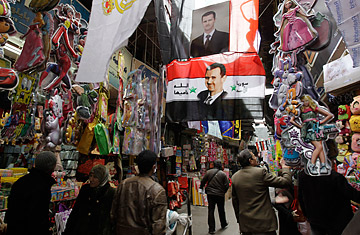
Syrian flags with images of President Bashar Assad decorate the street scene in Damascus on Feb. 5, 2011
(2 of 2)
The anti-riot police lowered their shields and surged forward as the regular police officers retreated in tandem. "As soon as they reached us they started hitting the people," says Ahmad, a 20-something postgraduate student at Damascus University whose name has been changed to protect his identity.
People fell to the ground as the crowd frantically dispersed. "I tried to help one guy who was hurt and on the ground," said Ahmad. "Unfortunately I was wearing a black suede jacket, he saw the jacket and thought I was a policeman and started screaming at me to leave him alone."
The green-clad forces swarmed around the protesters, joined by their plainclothes counterparts who were picking up several young men and shoving them into a mini-bus parked off to the side. "They were swearing at us," said Mazen, a protester in his 30s, "saying 'you dogs, you sons of bitches.'"
Ahmad, who had found out about the protest on Facebook and talked a friend into coming, was soon snatched by two of the men in black leather jackets, but quickly grabbed hold of a nearby metal fence. "I was going to try and resist because I had no idea where they would take me," he says. "They started beating me. One was grabbing my head, another twisting my arm behind my back, there were about three or four. I don't know how much time passed, it felt like seven or eight minutes, maybe it was more, I don't know."
At first, Ahmad said he tried pleading with the security men to stop hurting him, but to no avail. He noticed a small group of people watching the melee. "I knew that they couldn't approach and help because if they did they'd be beaten too and might be arrested. Still, I called out to them: 'people, help us.'" Nobody dared come forward.
After a struggle, the young man with the long lashes and shy demeanor, was hurled into the mini-bus and told to keep his head down at the risk of further beatings. Fourteen young men were detained that day. "They were yelling at us as they drove us away. 'You traitors,' 'you animals, you want to demonstrate?' things like that."
According to Ahmad, another detainee as well as several human rights activists who spoke to detainees, the group was taken to the Political Security division of the Interior Ministry. "I was thinking if this is the beating I get outside, in the open, what will they do to me once they get me inside?" Ahmad recalls.
He was surprised. The group was offered water, the use of the bathroom and the chance to wash up before being addressed by an officer who seemed to be in charge. "He didn't introduce himself to us, but he said 'We are all the sons of this country, we don't doubt your nationalism or your love for your country but we would prefer that this episode not be repeated,'" Ahmad says.
Some of the young men, perhaps emboldened by the civil reception, got the nerve to speak, asking why they'd been called traitors and beaten up. The officer reportedly put it down to ignorance. "Somebody told him that we were showing our support for the Libyan people," Ahmad says. "The officer replied, 'we also support the Libyan people, but if demonstrations were useful, we'd all take part in them, but they're not.'"
The group was politely released several hours later, after their names and contact information were noted and their mobile phones returned. But rather than frighten him, Ahmad says the detention (his first) has emboldened him. Still, he has taken precautions, changing his phone number and buying a new phone "in case they planted something in it."
"I overcame my fear before I decided to go down to the streets. As soon as I was on the streets, that was it, there was no point in worrying about being afraid,' he says. "I think the main reason for all of these demonstrations across the Arab world was the economic situation. If that's the case, then our economy is really bad too. I will continue to demonstrate, but I don't know where it will lead me." His future, like many others, will depend on whether Syria will tolerate small acts of dissent, or if it will utilize the iron fist it has honed over decades.
